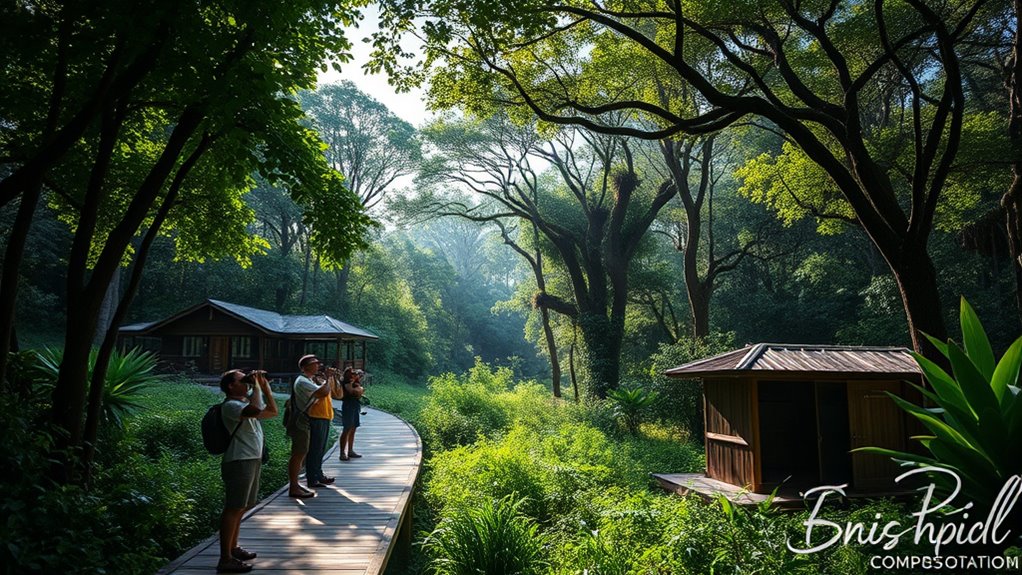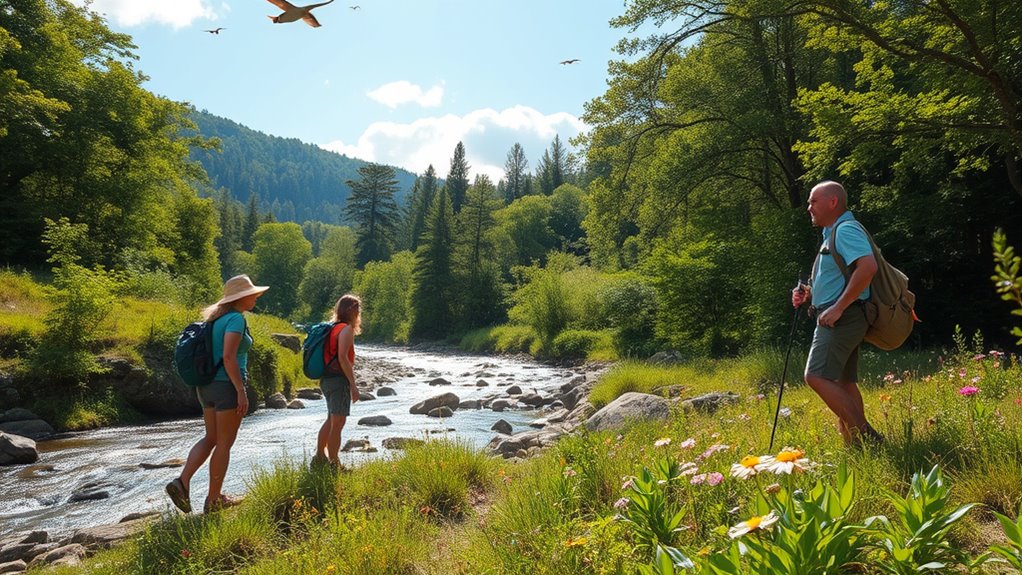Eco-tourism is about balancing your love for travel with a commitment to conservation. By choosing eco-friendly accommodations and supporting local businesses, you can minimize your impact on the environment. Engaging with communities helps ensure that tourism benefits everyone, respecting local cultures and traditions. When you travel sustainably, you also contribute to preserving natural resources. There’s so much more to discover about how you can make a positive impact on your next adventure!
Key Takeaways
- Choose eco-friendly accommodations that prioritize sustainability and minimize environmental impact through certifications like Green Seal or LEED.
- Engage in community-based tourism by supporting local businesses and participating in cultural experiences that empower residents and promote economic growth.
- Practice responsible travel by opting for public transit, electric vehicles, or biking, and by leaving no trace in natural areas.
- Involve local communities in tourism planning to ensure their voices are heard and to foster a sense of ownership over tourism developments.
- Educate yourself and other travelers about local ecosystems to promote environmental stewardship and conservation efforts during your visit.
Understanding Ecotourism Principles

Understanding the principles of ecotourism is crucial if you want to truly appreciate its impact on both the environment and local communities.
Ecotourism emphasizes responsible travel that conserves nature and supports local well-being through sustainable practices. You’ll find that it encourages non-consumptive interactions with ecosystems, ensuring their protection. By participating in ecotourism, you contribute to community-based initiatives that promote economic growth and cultural exchange. This form of travel also prioritizes low-impact facilities, minimizing harm to the environment while offering memorable experiences. Moreover, it recognizes and respects the rights of indigenous peoples, fostering mutual understanding. By embracing these principles, you help protect biodiversity and support conservation of natural areas projects, making your travels more meaningful and beneficial for everyone involved. Additionally, ecotourism often incorporates renewable energy technologies, which further enhances its sustainability efforts. The growing popularity of ecotourism can lead to increased investment in local conservation efforts, benefiting both the environment and communities. Furthermore, the integration of AI in education can help raise awareness about sustainable practices among travelers, promoting a more informed approach to ecotourism.
Best Practices for Sustainable Travel

When you embrace best practices for sustainable travel, you not only enhance your experience but also contribute to the health of the planet and local communities.
Start by choosing eco-friendly accommodations with certifications like Green Seal or LEED. Look for places that prioritize energy efficiency and local sourcing. Additionally, consider booking hotels that encourage reuse of towels to minimize waste. Many of these accommodations, such as eco-friendly resorts like Maquenque Eco Lodge, offer unique experiences that connect you with nature. Investing in sustainable practices can also lead to long-term benefits for both the environment and the local economy. For instance, using solar panels for camping can reduce your carbon footprint while enjoying the great outdoors.
For transportation, opt for public transit, electric vehicles, or bike for short distances.
Be mindful of resource conservation: take shorter showers, use reusable items, and avoid single-use plastics.
Engage in sustainable activities like eco-friendly tours and support local businesses.
Finally, practice responsible travel by exploring slowly, traveling off-season, and leaving no trace.
With these steps, you’ll make a positive impact while enjoying your adventures.
Engaging Local Communities

Engaging local communities is vital for successful eco-tourism, as it ensures that tourism projects resonate with the values and needs of those who live there. Involving residents in planning fosters culturally sensitive and economically viable initiatives, promoting transparency and understanding of tourism’s benefits. When locals participate from the start, you’ll see greater support and acceptance of tourism projects. Community-based tourism products, like arts workshops and culinary experiences, offer unique opportunities that directly benefit locals and integrate tourism into the economy. Empowering communities to control tourism development not only enhances cohesion but also ensures equitable financial benefits. Moreover, prioritizing local hiring fosters goodwill and supports the grassroots economy, further solidifying the community’s role in tourism. Additionally, open communication about feelings can help address any concerns locals may have about the impact of tourism on their daily lives. Furthermore, incorporating sustainable living practices into tourism initiatives can promote environmental stewardship and enhance the overall visitor experience. It is also essential to consider the importance of clear communication in maintaining positive relationships between tourists and the local community.
Benefits of Ecotourism for the Environment

Ecotourism offers numerous benefits for the environment, as it directly supports conservation efforts and promotes sustainable practices. By participating in ecotourism, you help protect natural resources through initiatives like reforestation and wildlife conservation. It emphasizes reducing carbon emissions by utilizing renewable energy and eco-friendly transportation, such as solar-powered irrigation systems that enhance crop yields. Proper venting techniques in ecotourism facilities can also minimize environmental impact by ensuring safe and efficient operations. Your involvement also aids in protecting biodiversity and preserving fragile ecosystems. Moreover, ecotourism fosters ecological literacy, enhancing your understanding of environmental issues and the importance of conservation. Engaging in creative practices can also inspire innovative solutions for sustainability and conservation efforts, as creative practice encourages problem-solving and adaptability. The revenue generated supports protected areas, ensuring the maintenance of national parks and wildlife reserves. Additionally, ecotourism can generate revenue for local communities, allowing them to invest in sustainable practices and conservation initiatives.
Overcoming Challenges in Ecotourism

While ecotourism provides significant environmental benefits, it also faces several challenges that need to be addressed for it to thrive sustainably.
Remote locations often lack the necessary infrastructure, making access difficult and increasing carbon emissions from travel. To combat this, investing in renewable energy and eco-friendly accommodations is essential. Additionally, excessive tourism can lead to degradation of fragile ecosystems meant for protection, further exacerbating environmental issues. Implementing air purification technology can help mitigate the impact of increased visitor traffic on air quality in these sensitive areas. HEPA filters are particularly effective at removing airborne pollutants, which can enhance the overall health of both visitors and local ecosystems. Regular monitoring of air quality indicators is crucial to ensure that the environmental impact is minimized.
Overcrowding at popular sites can lead to soil erosion and habitat disturbance, so implementing visitor regulations is crucial.
Additionally, tourism can threaten local cultures and displace communities, highlighting the need for community involvement and support for local economies.
Frequently Asked Questions
What Types of Accommodations Are Considered Eco-Friendly?
When you think about eco-friendly accommodations, consider options like ecolodges, eco glamping, and sustainable hostels.
Ecolodges offer luxury while using renewable resources, and eco glamping provides a unique blend of camping and comfort.
Hostels focus on budget-friendly stays with a strong emphasis on sustainability.
You might also explore eco farms, where you can engage in organic farming and enjoy farm-to-table meals, all while supporting local communities and minimizing your environmental impact.
How Can I Identify a Certified Sustainable Tour Operator?
Finding a certified sustainable tour operator can feel like searching for a needle in a haystack, but it doesn’t have to be!
Start by looking for recognized certifications, like GSTC or Travelife, displayed prominently in their marketing. Ensure these certifications align with international sustainability standards.
Also, check for independent audits and documentation that validates their practices.
Are There Specific Ecotourism Activities for Families?
Absolutely, there are plenty of ecotourism activities perfect for families!
You can enjoy hiking in national parks, where everyone can appreciate nature together. Bird watching is another fun option, sparking curiosity in kids.
Try kayaking on calm lakes, allowing you to explore waterways with minimal impact. Participating in community-driven projects, like beach cleanups, not only helps the environment but also teaches valuable lessons about conservation.
These activities create lasting memories for your family!
How Can Travelers Minimize Their Carbon Footprint While Traveling?
To minimize your carbon footprint while traveling, start by walking or cycling for short distances.
Choose public transport or trains over flights to cut emissions.
Opt for eco-conscious accommodations that prioritize sustainability.
Pack lightly to reduce fuel usage and use reusable items to limit waste.
Support local businesses and consider a plant-based diet.
Finally, calculate your emissions and invest in offset programs to balance your travel’s environmental impact effectively.
What Should I Pack for an Ecotourism Trip?
Imagine trekking through lush forests, the sound of a waterfall echoing nearby.
To prepare for your ecotourism adventure, pack waterproof hiking boots and comfortable walking shoes for support. Bring breathable shirts, lightweight pants, and a sunhat for protection.
Don’t forget a reusable water bottle, eco-friendly toiletries, and a small backpack for essentials. A rain jacket will keep you dry during sudden downpours.
With the right gear, you’ll embrace nature while minimizing your impact.
Conclusion
Incorporating ecotourism into your travel plans isn’t just about seeing beautiful landscapes; it’s about making a positive impact. You might worry that it’ll be too expensive or complicated, but remember, supporting local economies and preserving natural habitats can lead to enriching experiences that money can’t buy. By choosing sustainable practices, you’re not only enjoying your adventure but also ensuring future generations can appreciate these wonders too. So, embrace ecotourism—it’s a win-win for you and the planet!









